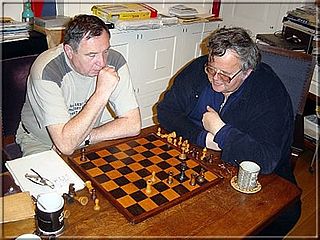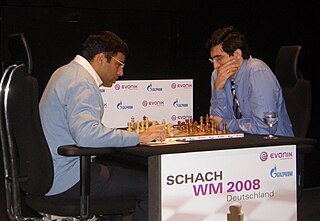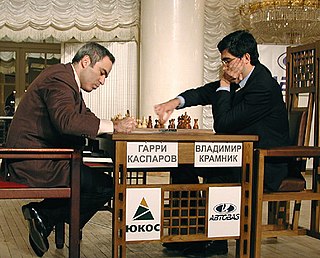 W
WThe following outline is provided as an overview of and topical guide to chess:
 W
WChess became a source of inspiration in the arts in literature soon after the spread of the game to the Arab World and Europe in the Middle Ages. The earliest works of art centered on the game are miniatures in medieval manuscripts, as well as poems, which were often created with the purpose of describing the rules. After chess gained popularity in the 15th and 16th centuries, many works of art related to the game were created. One of the best-known, Marco Girolamo Vida's poem Scacchia ludus, written in 1527, made such an impression on the readers that it singlehandedly inspired other authors to create poems about chess.
 W
WNote: Russian names may be written with other spellings. The list is ordered alphabetically by surname.Yochanan Afek. Israeli chess master and composer of endgame studies and problems. Grandmaster for chess compositions (2015). He published about 120 studies and won many awards, e.g. eleven first prizes. Iuri Akobia. Georgian composer of over 300 studies and author of many books on endgame composition, among which 4332 Studies with Stalemate, 4492 Studies with Mate, 4324 Studies with Positional draw. By profession a radiotechnical engineer, he worked for many years in the Georgian National TV station. Friedrich Amelung (1842–1909). Estonian composer of about 230 studies. Ghamiet Amirjan. Armenian composer of over 300 studies. Yuri Averbakh. Russian Grandmaster and composer of over 200 studies, many of which give important contributions to endgame theory. With Chekhover and others he published in 1956 a four-volumes encyclopedia on endgames: "Lehrbuch der Endspiele". Yuri Bazlov. Russian composer of about 120 studies, winner of 16 first prizes. In 2005 and 2006 he won the PCCC " Study of the Year " award. Pal Benko. Born in France from Hungarian parents, he emigrated to the US in 1956. A Hungarian-American grandmaster over the board, he composed many endgame studies, winning 24 first prizes. Charles Bent (1919–2004). English composer of over 800 studies, winner of seven first prizes. Johann Berger (1845–1933). Austrian chess master, composer of about 250 studies and author of many chess publications. Rinaldo Bianchetti. Italian endgame composer. In 1925 he published " Contributo alla teoria dei finali di soli pedoni " in which he proposed the theory of reciprocal squares in pawn endings. Filip Bondarenko (1905–1993). Ukrainian composer of over 400 studies, winner of 19 first prizes. Author of many books, among which Triumph of the Russian Study (1955). Vladimir Bron (1909–1985). Russian composer of over 400 studies and winner of 29 first prizes. Grandmaster for chess composition and author of many books, e.g. Selected studies and problems (1969).
 W
WThis bibliography of Bobby Fischer is a bibliography using APA style citations.
 W
WViswanathan Anand and Vladimir Kramnik have played 93 classical chess games, of which Kramnik won eleven, Anand won eleven, and 71 games were drawn. In rapid format Anand has 12 wins, Kramnik has 4 wins with 39 draws.
 W
WGarry Kasparov and Vladimir Kramnik have played 49 classical chess games, of which Kramnik won five, Kasparov won four, with the remaining 40 games drawn. Thus the overall score favors Kramnik (+5−4=40). If blitz and rapid games are included the overall score favors Kasparov (+22−21=79). The first decisive classical game between the two players was at Linares in 1994, which Kramnik won at the age of just 18.
 W
WThis article depicts many of the strongest chess tournaments in history.